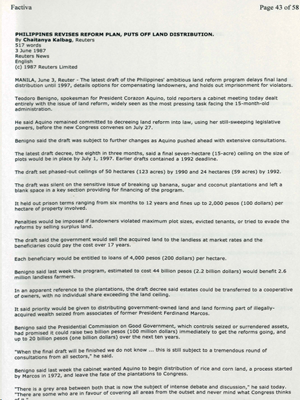Philippines Revises Reform Plan, Puts Off Land Distribution
[Reuters]
Published date: 3rd Jun 1987
View PDF3 June 1987
Reuters News English
(c) 1987 Reuters Limited
MANILA, June 3, Reuter – The latest draft of the Philippines’ ambitious land reform program delays final land distribution until 1997, details options for compensating landowners, and holds out imprisonment for violators.
Teodoro Benigno, spokesman for President Corazon Aquino, told reporters a cabinet meeting today dealt entirely with the issue of land reform, widely seen as the most pressing task facing the 15-month-old administration.
He said Aquino remained committed to decreeing land reform into law, using her still-sweeping legislative powers, before the new Congress convenes on July 27.
Benigno said the draft was subject to further changes as Aquino pushed ahead with extensive consultations.
The latest draft decree, the eighth in three months, said a final seven-hectare (15-acre) ceiling on the size of plots would be in place by July 1, 1997. Earlier drafts contained a 1992 deadline.
The draft set phased-out ceilings of 50 hectares (123 acres) by 1990 and 24 hectares (59 acres) by 1992.
The draft was silent on the sensitive issue of breaking up banana, sugar and coconut plantations and left a blank space in a key section providing for financing of the program.
It held out prison terms ranging from six months to 12 years and fines up to 2,000 pesos (100 dollars) per hectare of property involved.
Penalties would be imposed if landowners violated maximum plot sizes, evicted tenants, or tried to evade the reforms by selling surplus land.
The draft said the government would sell the acquired land to the landless at market rates and the beneficiaries could pay the cost over 17 years.
Each beneficiary would be entitled to loans of 4,000 pesos (200 dollars) per hectare.
Benigno said last week the program, estimated to cost 44 billion pesos (2.2 billion dollars) would benefit 2.6 million landless farmers.
In an apparent reference to the plantations, the draft decree said estates could be transferred to a cooperative of owners, with no individual share exceeding the land ceiling.
It said priority would be given to distributing government-owned land and land forming part of illegally acquired wealth seized from associates of former President Ferdinand Marcos.
Benigno said the Presidential Commission on Good Government, which controls seized or surrendered assets, had promised it could raise two billion pesos (100 million dollars) immediately to get the reforms going, and up to 20 billion pesos (one billion dollars) over the next ten years.
“When the final draft will be finished we do not know … this is still subject to a tremendous round of consultations from all sectors,” he said.
Benigno said last week the cabinet wanted Aquino to begin distribution of rice and corn land, a process started by Marcos in 1972, and leave the fate of the plantations to Congress.
“There is a grey area between both that is now the subject of intense debate and discussion,” he said today. “There are some who are in favour of covering all areas from the outset and never mind what Congress thinks of it.“






